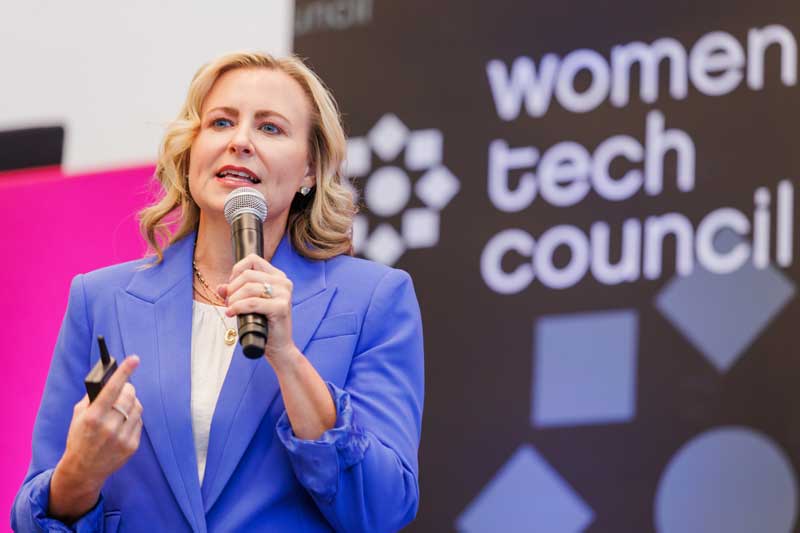Women Tech Council exec says women possess innate skills
Brice Wallace
Salt Lake Business Journal
Some people see the potential of artificial intelligence as beneficial, while others find it frightening. The leader of the Women Tech Council sees it as an opportunity for women.
Cydni Tetro, co-founder and president of WTC, recently told an audience in Midvale that women possess characteristics positioning them for success in an AI world. Among barriers that have held back women in technology has been their skillset, she said.
“But what’s happening in the world of AI is, soft skills are becoming more important,” Tetro said at WTC’s recent Innovation Summit at the Zions Bancorporation Technology Center. “If that’s true, then there’s an advantage for women because we are better at those skills naturally. And we’re going to take advantage of those and use those in an ever-changing world and use AI to help upskill and reskill and introduce skills to people entering the workforce.
“We have an ability to create parity across the skills that are necessary to order to work in technology and then create a unique advantage because of the skills that women bring to the table.”
Tetro said AI represents “one of the coolest opportunities that we have” in fixing the “broken rung” as women climb the corporate ladder to the C-suite and growing the percentage of women in technology jobs.
“Maybe, just maybe, AI becomes the answer to creating parity in leadership and economic opportunity for women in technology, because we have still held in the sub-30-percent women in technology for decades,” she said. “We haven’t been able to change that … and this might be the moment in time where we get to change that and take advantage.”
Tetro’s remarks to kick off the annual event, with the theme “The Age of AI,” featured several statistics related to AI, based on recent WTC surveys. Among them are that the fear of falling behind in the adoption of AI is the top concern among tech women about their careers.
The surveys also revealed that 70 percent of employees believe that AI will change about 30 percent of their jobs in two years. “I believe this will change,” Tetro said. “I think this number doubles, and I think the time frame it takes to change your job is less than a year.”
While 92 percent of companies plan to increase AI investments over the next three years and 85 million jobs globally are expected to shift due to AI, Tetro said that women are 10 percent to 40 percent less likely to use AI tools than men; 60 percent of women aren’t yet using AI in their jobs; and only 29 percent of women feel skilled in AI, compared to 71 percent of men.
Forty-two percent of women say they need more training to use AI confidently, and women tech leaders are 3 percent more likely than men to adopt AI, she said.
“One of the things that is true is that we are in an entirely new time in the technology ecosystem, because AI is reshaping how we work, how we show up, how we innovate and how we lead,” Tetro said. “And it’s an unprecedented time that we have really never seen before.”
She said the world contains a lot of uncertainty, some of it caused by AI. “All of us are trying to figure out where it’s going,” she said.
A recent survey by AI platform company Snowfire indicates where part of it is going. Utah managers asked about AI careers expected to boom locally said the top three positions are AI-driven software engineers for tech startups, health care AI solutions architects, and renewable energy systems optimization specialists.
The Snowfire survey indicates that nationally 15 percent of companies’ annual spending is earmarked for AI-related infrastructure. However, just 15 percent of C-suite teams are described as having a “deep understanding and regular use” of AI, while 22 percent fall into the “very low” category.
“If you look even 12 months ago to where we’re at today, the speed of business has accelerated more than we’ve ever seen,” Tetro said. “We truly are in a revolution that’s happening right now, right before our eyes. So that means we have an obligation to think about what it means for how we lead, how we innovate and where we’re going to take everything in the future.”
Those changes are happening quicker in tech companies “because they work at a different speed of business,” she said. “The challenge is, tech just sped up more than 100 percent, and that means dramatic things are happening across the entire ecosystem.
“The speed of it is one of the challenges I think we all face. It’s the reason we have to change the way we think and the way we learn in order to embrace what’s happening around us, because it is not only inevitable but it is happening at light speed around us.”








